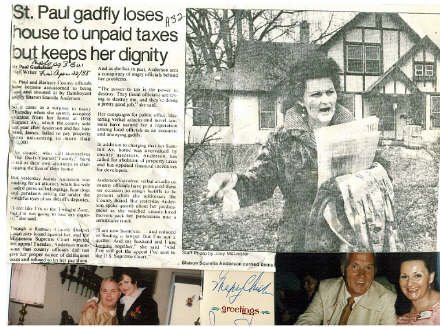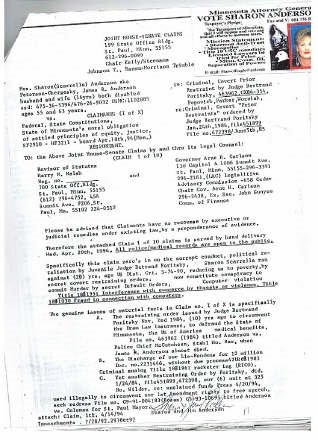|
651-266-8500 TO: Mark Oswald Ramsey Co. Auditor ie: Director Elections/Taxaction
political ?(Sharon4Anderson?)
Alliance for a Better Minnesota Sharon Anderson's Blog Click here: Sharon4Council file4[1]Shar_thune_22.pdf - Google Docs
Disclaimer on Site'sThe Electronic Communications Privacy Act MY FindLaw (ECPA) sets out the provisions for access, use, disclosure, interception and privacy protections of electronic communications. Sharon4Anderson Scribd pdf files. The law was enacted in 1986 and covers various forms of wire and electronic communications. According to the U.S. Code, electronic communications "means any transfer of signs, signals, writing, images, sounds, data, or intelligence of any nature transmitted in whole or in part by a wire, radio, electromagnetic, photo electronic or photo optical system that affects interstate or foreign commerce." ECPA prohibits unlawful access and certain disclosures of communication contents. Additionally, the law prevents government entities from requiring disclosure of electronic communications from a provider without proper procedure. The Legal Institute provides Title 18 of the U.S. Code, which encompasses ECPA. Blogger: Dashboard
NOTICE: This communication is not encrypted. This e-mail (including any attachments) is covered by the Electronic Communications Privacy Act, 18 U.S.C. §§ 2510-2521, and Electronic Communications Privacy Act The CAN-SPAM Act: Requirements for Commercial Emailers
A land patent is evidence of right, title, and/or interest to a tract of land, usually granted by a central, federal, or state government to an individual or private company. In the original 13 American Colonies, a proprietor would grant land patents. Besides patent, other terms for the certificate that grants such rights include first-title deed and final certificate. In the United States, all property can be traced back to the first title deed and to claims that document titles for land originally Homestead Act of 1862 Homestead Settlers Act - Google Search | |
| Summary
The Homestead Act of 1862 was passed by the U.S. Congress. It provided for the transfer of 160 acres (65 hectares) of unoccupied public land to each homesteader on payment of a nominal fee after five years of residence; land could also be acquired after six months of residence at $1.25 an acre. The government had previously sold land to settlers in the West for revenue purposes. As the West became politically stronger, however, pressure was increased upon Congress to guarantee free land to settlers. Several bills providing for free distribution of land were defeated in Congress; in 1860 a bill was passed in Congress but was vetoed by President Buchanan. With the ascendancy of the Republican party (which had committed itself to homestead legislation) and with the secession of the South (which had opposed free distribution of land), the Homestead Act, sponsored by Galusha A. Grow, became law. In 1976 it expired in all the states but Alaska, where it ended in 1986. | |
| THIRTY-SEVENTH CONGRESS
Sess. II Ch. 75 1862 Homestead Act of 1862 Chap. LXXV. -- An Act to secure Homestead to actual Settlers on Public Domain. Be It enacted by the Senate and House of Representatives of the United States of America in assembled, That any person who is the head of a family, or who has arrived at the age of twenty-one years, and is a citizen of the United States, or who shall have filed his declaration intention to become such, as | SEC. 3. And be it further enacted, That the register of the land office shall note all such applications on the tract books and plats of his office, and keep a register of all such entries, and make return thereof to the General Land Office, together with the proof upon which they have been founded.
SEC. 4. And be it further enacted, That no lands acquired under the provisions of this act shall in any event become liable to the satisfaction of any debt of debts contracted prior to the issuing of the patent therefor. |







